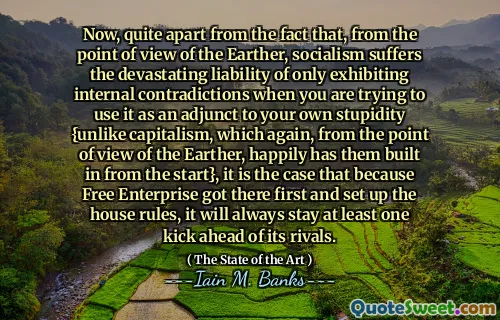On Earth one of the things that a large proportion of the locals is most proud of is this wonderful economic system which, with a sureness and certainty so comprehensive one could almost imagine the process bears some relation to their limited and limiting notions of either thermodynamics or God, all food, comfort, energy, shelter, space, fuel and sustenance gravitates naturally and easily away from those who need it most and towards those who need it least. Indeed, those on the receiving end of such are often harmed unto death by its arrival, though the effects may take years and generations to manifest themselves.
The passage reflects a stark critique of Earth's economic system, highlighting how resources seem to flow from those who need them most to those who require them least. It suggests that this process is not only misguided but has almost become a normalized aspect of society's operations. The author implies that people take pride in a system that paradoxically perpetuates inequality and does so with a sense of inevitability akin to natural laws, suggesting a disconnect between those with privilege and the realities faced by the less fortunate.
Moreover, the text hints at the long-term detrimental effects of such an economic model, indicating that the harm caused by this resource distribution may not be immediately visible but will manifest over generations. This raises questions about the sustainability and morality of the existing system, touching on the idea that what is often celebrated may, in fact, be a source of suffering for many. The author invites readers to reconsider their understanding of prosperity and the consequences of societal structures that prioritize the needs of a few over the many.


